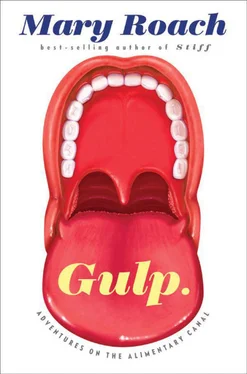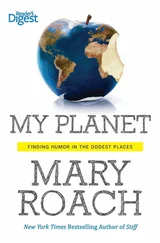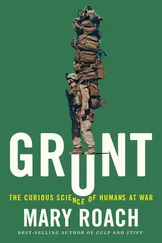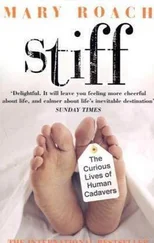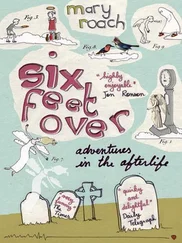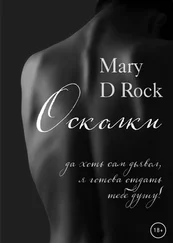The only thing sadder than swallowing mush is not swallowing at all. Tube-feeding is a deeply depressing state of affairs. Rather than chew and spit out his food, Tom Little—the Irishman with the strictured esophagus—could have mashed it and pushed it directly into his stomach. In fact, he tried this, but without chewing, it “failed to satisfy.” (Beer, however, was poured directly into the funnel.) Here’s how badly people want to chew. Recall that dysphagia may knock out the reflex that repositions the larynx (voice box) to allow food into the esophagus. Jennifer Long told me these patients have on occasion asked to have their voice box surgically removed so they can swallow again. In other words, they would rather be mute than tube-fed.
Crispy foods carry a uniquely powerful appeal. I asked Chen what might lie behind this seemingly universal drive to crunch things in our mouths. “I believe human being has a destructive nature in its genes,” he answered. “Human has a strange way of stress-release by punching, kicking, smashing, or other forms of destructive actions. Eating could be one of them. The action of teeth crushing food is a destructive process, and we receive pleasure from that, or become de-stressed.”
I run this by René de Wijk when I get back to his house in the evening. He is slouched on the sofa, his frizzy hair falling in clumps on his forehead. His son sits between us, playing Assassin’s Creed on the TV screen. A man in a cowled robe is doing some de-stressing, bludgeoning people and slicing them in two with a broadsword.
René agrees with Chen’s assessment. “With crispy, it’s so obvious that you’re destroying the food in order to get your sensation. What is more marvelous than to control a nice structure with your mouth?” René doesn’t know offhand of any studies on the psychology of crunchy food, but he promised to e-mail a colleague, Ton van Vliet, a food physicist who has devoted the past eight years of his career to a deeper understanding of crispy-crunchy.
The assassin bisects another citizen while René and his wife discuss the thermostat. The heating people have been out to fix it, and now they’re coming back because it’s on the fritz again. I point the toe of my boot at the TV. “That guy seems effective. Get him on board.”
René looks at the screen. “He has his creed, he would kill the heating people!”
I was originally to have spent the afternoon with René in the Wageningen University Oral Lab. He had promised to wire me up to the articulograph and generate a 3-D profile of my chewing style, but he couldn’t recall which sensor went where. I sat with a beard of colored wires hanging from my cheeks while René flipped through the manual. And then he had to leave for a meeting.
Nonetheless, he’s been very effective at persuading other harried researchers to let me eat up their time. Ton van Vliet has agreed to meet us the following day at my home-away-from-home, the Restaurant of the Future.
VAN VLIET IS there when René and I arrive, sitting with his back to us at a table in the middle of the room. René recognizes the white hair. The longer strands appear to originate from a source at the back of the head and travel forward from there. All I can guess is that he walked here with a fierce wind at his back.
Van Vliet looks up as if from deep thought, a little startled, and extends his hand. He has a fine-boned face accented by an Amish-style beard and delicate-looking wire-rim glasses. I don’t want to use the word elfin, in case it seems belittling, but it did come to mind.
Van Vliet wants to start me out with the basics of crispy-crunchy. We begin with nature’s version, a fresh apple or carrot. “It’s all bubbles and beams,” he says, sketching networks of water-filled cells and cell walls on a sheet of my notepad paper. When you bite into an apple, the flesh deforms, and at a certain moment the cell walls burst. And there is your crunch. (Ditto crispy snack foods, but here the bubbles are filled with air.) “This is why fresh fruit is crisp, and also why it is a little bit juicy,” says van Vliet. His voice is reedy and high-pitched, with a musical cadence.
As a piece of produce begins to decay, the cell walls break down and water leaks out. Now nothing bursts. Your fruit is no longer crisp. It is mealy or limp or mushy. The same thing happens with a snack food degraded by moisture: cell walls dissolve, air leaks out.
The staler the chip, the quieter. For a food to make an audible noise when it breaks, there must be what’s called a brittle fracture—a sudden, high-speed crack. “Like this.” Van Vliet is drawing graphs again. As you bite down on a chip, energy builds and is stored. In a millisecond, the chip gives way and the stored energy is released, all at once. Crack is a superb onomatopoeia; the word sounds like the noise, and the noise is the fracture. (Crumbly foods, by contrast, break apart quietly because the energy isn’t released all at once.)
Van Vliet reaches for a bag of puffed cassava chips René bought for us to use as props. He snaps one in two. “To get this noise, you need crack speeds of 300 meters per second.” The speed of sound. The crunch of a chip is a tiny sonic boom inside your mouth. Van Vliet rubs his palms together to brush off the crumbs. This too makes a sound, dry like papers being shuffled. The Dutch winter is a brutal desiccant, to borrow from the language of snack foods.
René and I have been working our way through the props. He tilts the bag toward van Vliet, who waves it off. “I don’t like chips and things.”
René and I exchange a glance: Get out!
“I like beschuit …” He turns to me. “It’s a Dutch toast that is round. We serve it when babies are born.”
René wears an expression that FaceReader will have no trouble decoding. “Are you kidding me? It is so dry. I mean, you cannot move your tongue anymore! Really, I am hoping no more babies are born.”
“It’s very nice,” insists van Vliet. “You have to put butter on it, and then honey on it.”
I get up to look for some, but the restaurant has none.
Van Vliet juts his jaw. “Then that is not a good restaurant.”
René leans in close to van Vliet, laughing. “It’s a very good restaurant that takes care of its customers.”
Moving along, van Vliet provides the answer I was looking for. Crispness and crunch appeal to us because they signal freshness. Old, rotting, mushy produce can make you ill. At the very least, it has lost much of its nutritional vim. So it makes sense that humans evolved a preference for crisp and crunchy foods.
To a certain extent we eat with our ears. The sound made by biting off a piece of carrot—more so than its taste or smell—communicates freshness. René told me about an experiment in which subjects ate potato chips while a researcher digitally altered the sounds of their chewing. If they muted the crunch or masked the higher frequencies, people no longer sensed the crispness. “They rated the chips as old even though the texture had not changed.”
Van Vliet is nodding. “People eat physics. You eat physical properties with a little bit of taste and aroma. And if the physics is not good, then you don’t eat it.”
Crispness and crunch are the body’s shorthand for “healthy.” The snack-food empires have cashed in on this fact, producing crisp, crunchable foods that appeal to us but fail to deliver in terms of health and survival.
A good amount of thought appears to have gone into designing optimal crunch. “People like it most when it is around 90 to 100 decibels,” says van Vliet. To achieve that, you need about a hundred bubbles bursting in rapid succession. “An avalanche of cracks in your mouth! To the ear it sounds like one sound, but in fact it is made up of more than one hundred sound bursts.” This is achieved by messing around with the bubbles and beams—their size, their brittleness.
Читать дальше
